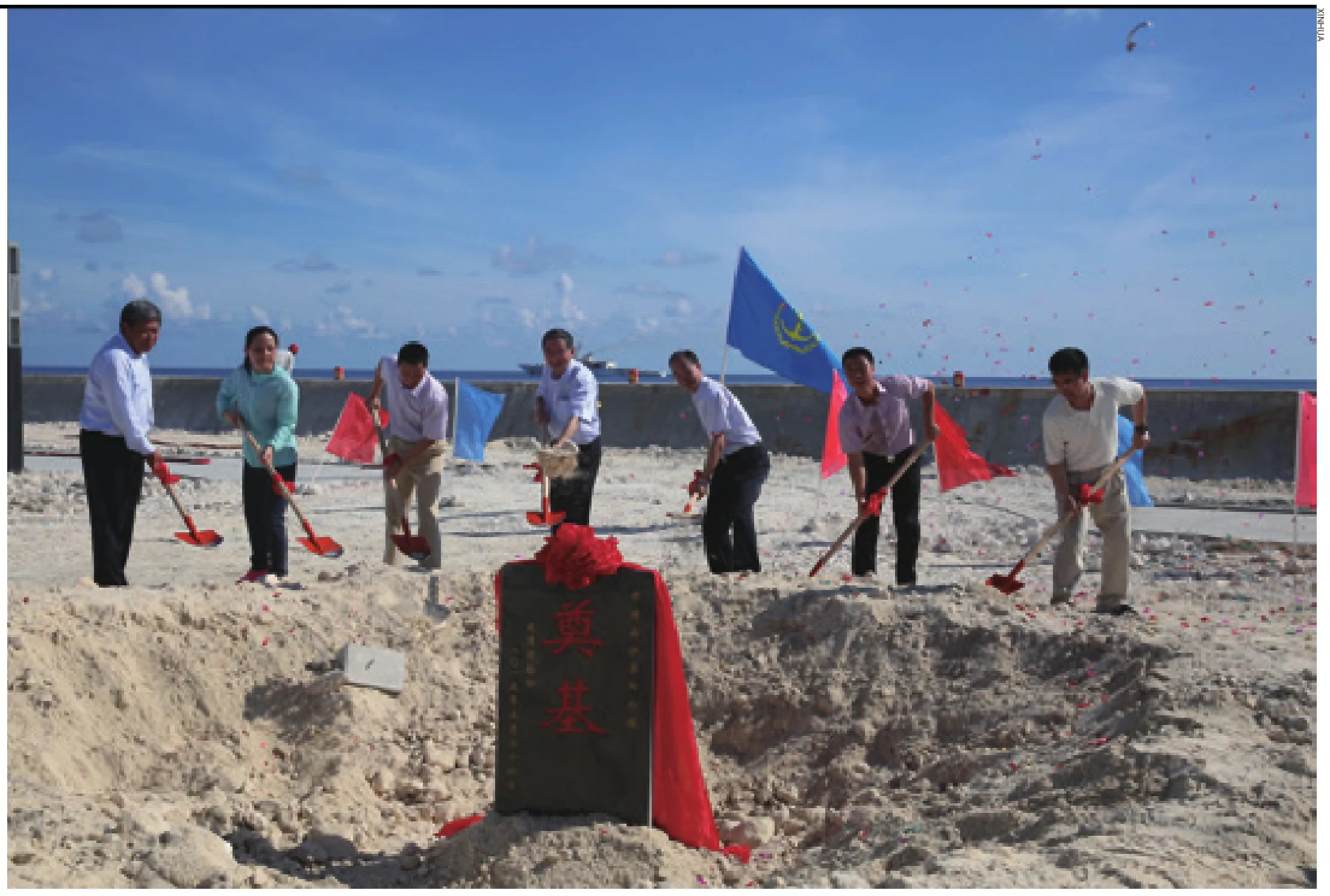Calming Stormy Waters
2016-09-22
Calming Stormy Waters

Editor's Note: Tom Nagorski, Executive Vice President of the New York-headquartered Asia Society and former Foreign Editor for World News Tonight, a daily evening television news program of the U.S.-based ABC News, moderated a recent discussion at the society called, The South China Sea: A View From Beijing.
To get an insider's perspective on this divisive issue, Nagorski interviewed Li Zhaoxing, President of the China Public Diplomacy Association and former Chairman of the Foreign Affairs Committee of the National People's Congress of China. Li asserted China's historical right to the area as a “continuous, peaceful jurisdiction over these islands,”adding that the last thing China wants to see is turmoil or even war in “our neighborhood.” Li is also confdent that a peaceful resolution to the disputes can be achieved.
An edited version of the interview follows:
“What is so wrong about building some buildings or installations on our own islands? All countries are entitled to have some construction on their own territory.”
—Li Zhaoxing
Tom Nagorski: With this ruling [on the arbitration case initiated by the Philippines over China's sovereignty claims in the South China Sea] that is about to come [especially if it goes in favor of the Philippines], do you think it will be a catalyst for further negotiation or some greater conflict?
Li Zhaoxing: This month, while you celebrate your 60th anniversary of the Asia Society, is also the month I celebrate the 52nd anniversary of my foreign service in governmental, parliamentary and people-to-people diplomacy. Based on my foreign service experience, I think we should wait for the fnal outcome [from the Permanent Court of Arbitration in The Hague] and not dwell on hypotheticals.
I think our position is very clear. The arbitration case submitted by the Philippines is in itself illegal and unreasonable. Whatever the outcome, whatever the ruling is, China, as one of the founding members of the UN—one of the signatories of the 1945 San Francisco Treaty and the UN Convention on the Law of the Sea (UNCLOS), has every right to reject the fnal ruling. We are on the side of justice.
Some people who are airing some views on this issue, some political figures or scholars, maybe have not read the UN Charter or UNCLOS. A certain country, since the signing of UNCLOS in 1982, has not yet signed or ratifed this convention, and yet this country wants to make an issue of this convention. I want scholars and friends here to explain that to me.
The United States is always referred to as a “non-regional actor” or a “non-relevant actor” in this case. Never as just the United States.
You say we have nothing to fear at the moment. But there are people who are afraid of what may come. How tense or dangerous is this moment?
When I said there is nothing to fear, I think it is on one condition that all the relevant countries should be prudent and should obey the UN Charter and UNCLOS. According to the UN Charter, all countries,big and small, are on an equal footing. And the UN as a body should not interfere in the internal affairs of its member states, let alone the interference of one member country into another country's internal affairs.
The first article of the UN Charter says there are some conficts in the world, but we should resort to peaceful talks by diplomats rather than wars carried by air force, navies or aircraft carriers. Everybody should cherish peace. As long as we cherish peace, peace is attainable.
There is one element of this issue that many people ask, which is about the“rocks vs. islands” question. While China says it wants to pursue a peaceful solution, it is hard for many people to understand when they look at what has happened to many of those “rocks”—concrete has been poured on them and, in some cases, runways have been created and a military presence established. What do you say to people who say that does not look like the behavior of a government that is seeking a peaceful resolution of the issue?
I think the simple facts are the most important facts—those islands, those “rocks” as you call them, belong to China. What is so wrong about building some buildings or installations on our own islands? All countries are entitled to have some construction on their own territory. As you said, China claims to pursue a peaceful negotiation on this issue but is building some installations on these islands. I think some people pretend to be ignorant or vilify China on purpose.
The defense policy of China has always been of a defensive nature. China has never occupied an inch of land or water of other countries.

A ground-breaking ceremony is held on Huayang Reef in the South China Sea on May 26, 2015, to mark the beginning of construction of two multi-functional lighthouses. The lighthouses, as the frst civil aids to navigation in the Nansha waters, were put into use last October
Today's world is a global village of interconnectivity. China is engaged in friendly relationships with all countries for no conficts, no confrontation and mutually benefcial cooperation.
According to you, some people may question why, as a peace-loving nation, China will have military installations on the islands? But why would some country send fghter jets and warships to islands in the South China Sea far from their home? What's wrong with us building on some rocks and [setting up] installations on our own doorstep? So, those people might be turning a blind eye to the facts.
Here's a question from the audience that relates to what you just said, it's unsigned:“Why does China object to U.S. military vessels and air flights if there is alleged freedom of navigation in and overflight above the South China Sea for all countries?”
China is working with all parties concerned to ensure the safety of navigation in and overfight above the South China Sea—but maybe some country is trying to threaten other countries in the South China Sea for their own selfsh gain. Maybe some country is trying to be a leader and assert dominance in a place far away from their home. This is hard to understand for us.
Just now you said the question is unsigned, so I want to ask this question to the person: Can you give me one example of a country's freedom of navigation or overfight that has been impeded? I don't want to put this person on the spot, so if you don't want to answer, it is fne.
I have a question of my own about what has come to be known as ADIZ [Air Defense Identification Zone]. One of these was proposed by China over the East China Sea on the question of overflights three years ago. U.S. Secretary of State [John] Kerry has said that would be “provocative and destabilizing.” Do you think it's going to happen? Secondly,would that be an act of provocation by China?
China has never threatened other nations, so if some high-level diplomats say such things, it would be unfair and sad. That reminds me of my great American teachers when I was in college. Two American teachers taught me English writing and American history. They both taught me to respect the facts.
When I was foreign minister of China, I also made friends with two excellent secretaries of state in America. I see them as my teachers and I learned from them. One of the two told me that the Chinese people will never forget the Nanjing Massacre, which happened from December 1937 to January 1938. You can never forget what happened during that time in Nanjing, just like American people will never forget what happened in Pearl Harbor on December 7, 1941.
Can anyone give me an example of who China has threatened? When has China sent any warships around the territory of the United States? About ADIZ, actually it was not invented by China. China established the ADIZ according to international law. Many countries have established ADIZs years ago, before China, so why cannot China do this? ■
Copyedited by Francisco Little
Comments to liuyunyun@bjreview.com
